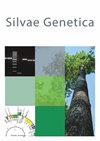柚木克隆的生长、形态和木材特性的基因组预测和候选单核苷酸多态性
IF 1
4区 农林科学
Q3 FORESTRY
引用次数: 0
摘要
柚木(Tectona grandis)是一种主要的硬木木材,在整个热带地区广泛种植。该研究旨在首次使用单核苷酸多态性(SNP)标记对柚木克隆进行基因组筛选,并评估预测茎干体积(VOL)、直径(DBH)、形态质量分数(QS)、比重(SG)和心材百分比(HW)的前景。对哥斯达黎加北部基因测试中的 33 个精英柚木克隆进行了 10812 个 SNP 位点的基因分型,并与柚木参考基因组序列进行了比对。基因组关系矩阵揭示了 7 个亲缘关系较高的隐性克隆组,组内亲缘关系值与全兄弟家族一致。根据 26 个基因型克隆的 5 年田间数据计算出了 5 个性状的克隆值。利用贝叶斯岭回归、贝叶斯A、贝叶斯B、贝叶斯C和贝叶斯拉索对克隆值进行了基因组预测模型拟合。DBH(高达 0.66)、VOL(高达 0.63)和 SG(0.58)的预测能力(PA)最高,QS 和 HW 的最佳 PA 分别为 0.42 和 0.40。GWAS 发现了 7 个体积、7 个 DBH、4 个 QS 和 8 个 SG 的独特 SNP 标记。由于实验规模较小,错误发现率相对较大。柚木育种者完全有能力从基因组工具和方法中获益,对柚木育种和部署群体进行大规模基因分型。将基因组技术广泛融入柚木育种系统,缩短育种周期,预计将带来显著优势。本文章由计算机程序翻译,如有差异,请以英文原文为准。
Genomic predictions and candidate single nucleotide polymorphisms for growth, form, and wood properties of teak clones
Teak (Tectona grandis ) is a premier hardwood timber, extensively cultivated throughout the tropics. The study aimed to undertake the first genomic selection of teak clones using single nucleotide polymorphism (SNP) markers and evaluate the prospects for prediction of stem volume (VOL), diameter (DBH), form Quality Score (QS), Specific Gravity (SG), and Heartwood Percentage (HW). Thirty-three elite teak clones from a genetic test in northern Costa Rica were genotyped at 10812 SNP loci and aligned to the teak reference genome sequence. The genomic relationship matrix revealed 7 cryptic groups of more highly related clones and within-group kinship values were consistent with full-sib families. Clone values for each of the 5 traits were calculated from 5-year field data for 26 of the geno-typed clones. Genomic prediction models were fitted to clone values using Bayesian Ridge Regression, BayesA, BayesB, BayesC, and Bayes Lasso. Predictive ability (PA) was greatest for DBH (up to 0.66), VOL (up to 0.63), SG (0.58), with 0.42 and 0.40 as the best PA for QS and HW, respectively. GWAS resulted in the discovery of 7 unique SNP markers for volume, 7 for DBH, 4 for QS, and 8 for SG. The small experimental size resulted in relatively large false discovery rates. Teak breeders are well positioned to benefit from the genomic tools and approaches to genotyping teak breeding and deployment populations on a large scale. Significant advantages are expected from widespread integration of genomic technologies into teak breeding systems to allow shortening of the breeding cycle.
求助全文
通过发布文献求助,成功后即可免费获取论文全文。
去求助
来源期刊

Silvae Genetica
农林科学-林学
CiteScore
2.20
自引率
10.00%
发文量
10
审稿时长
3 months
期刊介绍:
Silvae Genetica is an international peer reviewed journal with more than 65 year tradition and experience in all fields of theoretical and applied Forest Genetics and Tree breeding. It continues "Zeitschrift für Forstgenetik und Forstpflanzenzüchtung" (Journal of Forest Genetics and Forest Tree Breeding) founded by W. LANGNER in 1951.
 求助内容:
求助内容: 应助结果提醒方式:
应助结果提醒方式:


